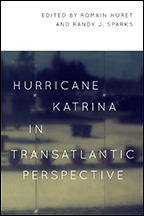
248 pages / 6.00 x 9.00 inches / 10 halftones, 8 maps, 1 chart
History / United States - Southern History | History / Current Events | Social Studies / Regional Studies
“There is no such thing as a ‘natural’ disaster,” writes Romain Huret in his introduction to this multidisciplinary study of the events surrounding and the legacy of Hurricane Katrina. Though nature produced Katrina’s rising waters and destructive winds, a vast array of manmade factors shaped the scope of the storm’s impact as well as the local and national response to it. In Hurricane Katrina in Transatlantic Perspective, American and European scholars approach this infamous storm and its aftermath through a variety of disciplines, from music to geography to anthropology, creating a nuanced understanding of how society reacts to and later remembers times of disaster.
Richard Campanella and Romain Huret examine the particular geographical and political mix that set the stage for Katrina’s devastation, especially among the poorest populations of New Orleans and the Gulf South. Jean Kempf, James Boyden, Andrew Diamond, and Thomas Jessen Adams address the ideological biases and racial stereotypes that infused local and national commentary in the days and weeks after the storm. Finally, Bruce Raeburn, Sara Le Menestrel, Anne M. Lovell, and Randy J. Sparks explore the impact of this powerful tropical event on the city’s institutions and cultural organizations.
Hurricane Katrina in Transatlantic Perspective offers a profound and innovative collection of insights on one of the most significant environmental catastrophes in U.S. history, forcing us to examine the cultural actors that transformed a natural disaster into a humanitarian crisis.
Romain Huret is associate professor of American history at the University of Lyon II. He is the author of American Tax Resisters.
Randy J. Sparks is professor of history at Tulane University. He is the author of several books, most recently The Two Princes of Calabar: An Eighteenth-Century Atlantic Odyssey and Where the Negroes Are Masters: An African Port in the Era of the Slave Trade.
“This volume is best described as a fine, ongoing commemoration of the lives destroyed by Katrina, and a reflection of a worldwide desire to see a unique city and its inhabitants—rich, poor, black, white—recover and thrive, and in that, it does an excellent job.”—Arkansas Review
“A timely contribution to the now-substantial body of scholarship on that storm and to the broader body of literature on human dimensions of hazards and disasters. . . . Hurricane Katrina in Transatlantic Perspective is a well-presented contribution to scholarly thought on Katrina. Its chapters are uniformly strong and collectively demonstrate the promise of humanities scholarship in hazards and disaster research.”—Historical Geography
“Superlative. . . . Hurricane Katrina in Transatlantic Perspective is an excellent primer on several of the most striking issues facing New Orleans before, during, and after the storm.”—Louisiana History
Found an Error? Tell us about it.